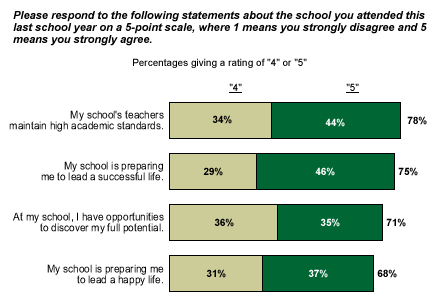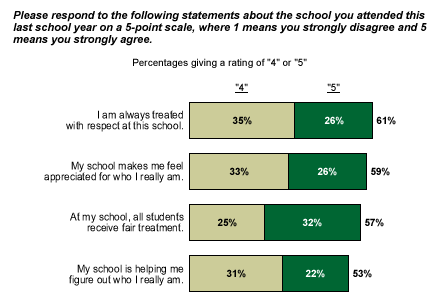In recent years, America's schools have had a particularly tough time meeting the various expectations of policy-makers, business leaders, and parents. But consider the multifaceted nature of their mission: Schools must prepare students academically, cultivate their character, and help them discover their own potential. Perhaps most fundamental, particularly from parents' perspectives, is that schools help prepare children to find a career that makes them happy. And all of this must be pulled off with minimal resources and an increasingly diverse student population.
Not exactly a piece of cake. So how well are schools executing these various tasks according to the ultimate insiders -- students themselves? A recent Gallup Youth Survey* broke aspects of that mission into eight component goals. Teens were asked to rate each goal on a scale of "1" to "5," where "5" means they "strongly agree" that their school is helping them in that way, and "1" means they "strongly disagree."
The good news is that most of the teens rated each of the goals with a "4" or "5," revealing at least moderate agreement across the board. On the other hand, on none of the goals did a majority give a rating of "5," indicating strong agreement.
Top-Rated Items
Four of the items received a "4" or "5" from at least two-thirds of students. Seventy-eight percent gave a "4" or "5" to the item, "My school's teachers maintain high academic standards." The other three items that were most likely to meet with some level of agreement were related to whether schools are preparing students for life after school. Seventy-five percent of teens agreed that their schools are preparing them to lead a successful life, 68% agreed their schools are preparing them for a happy life, and 71% agreed their schools give them the opportunity to discover their full potential.

Lower-Rated Items
Respondents were less likely to agree with the four items that pertain less to rigor and preparation, and more to the ideas that their schools make them feel respected as individuals. About 6 in 10 agreed that their schools treat them with respect, treat other students fairly, and make them feel appreciated for who they really are. However, only a slim majority agreed their schools are helping them figure out who they really are -- with 53% of teens giving this item a "4" or "5"; this was the lowest-rated goal.

Is that goal -- helping students with self-discovery -- as important as those more strictly related to the transfer of knowledge? Some educators have argued that it is, particularly in a world in which jobs are often transient and increasingly specialized. "A child with a sense of identity will be able to go into different situations and experience herself as having a continuous, recognizable existence no matter what the circumstances …" write psychologist Michael Thompson and journalist Teresa Barker in their 2004 book, The Pressured Child. "An individual pays a serious price for not developing a separate and unique identity, and every child is striving for it in their school journey."
*These results are based on Web surveys with a randomly selected national sample of 600 teenagers in The Gallup Panel of households, aged 13 to 17, conducted July 6 to Sept. 4, 2005. For results based on this sample, one can say with 95% confidence that the maximum error attributable to sampling and other random effects is ±4 percentage points. In addition to sampling error, question wording and practical difficulties in conducting surveys can introduce error or bias into the findings of public opinion polls.